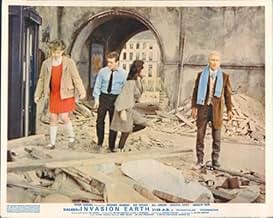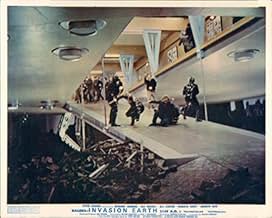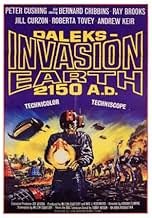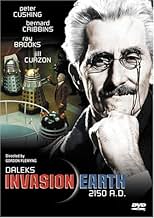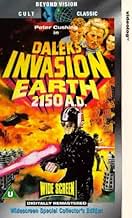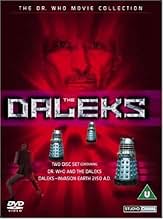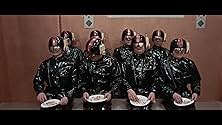IMDb RATING
5.9/10
4.9K
YOUR RATING
Dr. Who and his companions arrive on Earth in the year 2150 AD, only to discover that the planet has been invaded and its population enslaved by the dreaded Daleks.Dr. Who and his companions arrive on Earth in the year 2150 AD, only to discover that the planet has been invaded and its population enslaved by the dreaded Daleks.Dr. Who and his companions arrive on Earth in the year 2150 AD, only to discover that the planet has been invaded and its population enslaved by the dreaded Daleks.
Featured reviews
Daleks-Invasion-Earth:2150 AD, is an enormous improval on the preceeding film. It is more exciting and enjoyable and there is an impending sense of fear throughout the movie wich was evident in the Television series around this time. Peter Cushing gets to grips with his role as The Doctor in this movie. Bernard Cribbins comes on board and is fantastic. Ray Brooks and Jill Curzon enhance the swinging sixties fell apparent in the previous film, and the action never gives up. The multi coloured Daleks are a more frightening sight in a future decaying London thatn on there own planet, and the set designs and designs of the vicious Robomen are again superb. This is a juvenile movie, but enjoyable at that. For a new Doctor Who movie, someone like Tim Burton or Steven Spielberg should remake this, and they would have an absolute goldmine on their hands.
The On Her Majesty's Secret Service of the Doctor Who world, the two Peter Cushing-Dalek films have seen occasional reappraisal that labels them as "coolly kitsch" or "lovably camp". In reality, of course, they're complete pants.
The Doctor Who TV series actually had a considerable integrity, despite being made on a budget of 50p and never managing to shake off the "Kid's Telly" tag. Here Cushing plays the Doctor of the title, his surname actually becoming "Who". The Tardis, his sophisticated space-time machine, is now "Tardis", a naff-looking thing with a Yale lock on the door. Around the time this was made a "Carry On" actor would do his only television work in the Doctor Who series Peter Butterworth as the Meddling Monk. For the film we got Bernard Cribbins as P.C. Tom Campbell, a similar character to the one that married the Doctor's granddaughter on TV. Though as the film Susan is only ten that would be inappropriate here.
Both films (the other Doctor Who and the Daleks, Cushing joined by Roy Castle) were based directly on actual TV stories, the novelty being they were in colour. By the time the second came around the novelty was over and it didn't do the business of the first, despite being someway the better film. Perhaps this is because the original serial The Dalek Invasion of Earth was an attempt to mount a film's epic scale on a TV budget. To this end it transfers better to the medium, and its setting (future Earth as opposed to the first film's alien planet Skaro) is more accessible to audiences.
The big failure is, of course, send-up. Some of the series' b-movie concepts (mutated nuclear war victims get robot-armoured shells and invade Earth to steal its core) are ludicrous, but played straight can be rewarding. The films make a mockery of the whole concept, showing a total lack of respect for their source material. My advice is: if you don't like 'em, don't make 'em. Bearing in mind the Daleks were hot merchandise properties at the time, this is a cynical cash-in on the nation's youth. There's even a shameless product placement for Sugar Puff Cereals.
All involved are capable of better. Peter Cushing, respected in adult horror films, here opts for a no-effort parody of TV Doctor William Hartnell's performance. There is no trace of depth or consideration for the part he has chosen. Full credit does go to Ray Brooks, Andrew Keir and Philip Madoc for at least trying to take it seriously. Madoc was rewarded with four seperate roles in the television series, most notably as mad scientist Solon (1976) and The War Lord (1969). On the plus side, direction in terms of camera angles is actually very, very good, but is offset by incidental music so loud and outdated that it works against the mood entirely. Think SF drama with Carry On music and you're almost there.
Bright and colourful, (including a funky red Dalek) the film certainly has visual appeal. But the Daleks' voices, their volume increased considerably, are extremely grating. They also lack their trademark warmth and charm, being little more than robots. Their weaponry was scheduled to be flame-throwers, but was disallowed due to the young audience. This is perhaps fortunate as their gas sprays aid the Nazi allegory. Best bit? The exploding shed.
Trite jazz, lame comic setpieces and binliner outfits, the film is on TV virtually every Bank Holiday in England. And you know the strangest part? As bad as it is, come next Bank Holiday I'll probably be tempted to see it again.
The Doctor Who TV series actually had a considerable integrity, despite being made on a budget of 50p and never managing to shake off the "Kid's Telly" tag. Here Cushing plays the Doctor of the title, his surname actually becoming "Who". The Tardis, his sophisticated space-time machine, is now "Tardis", a naff-looking thing with a Yale lock on the door. Around the time this was made a "Carry On" actor would do his only television work in the Doctor Who series Peter Butterworth as the Meddling Monk. For the film we got Bernard Cribbins as P.C. Tom Campbell, a similar character to the one that married the Doctor's granddaughter on TV. Though as the film Susan is only ten that would be inappropriate here.
Both films (the other Doctor Who and the Daleks, Cushing joined by Roy Castle) were based directly on actual TV stories, the novelty being they were in colour. By the time the second came around the novelty was over and it didn't do the business of the first, despite being someway the better film. Perhaps this is because the original serial The Dalek Invasion of Earth was an attempt to mount a film's epic scale on a TV budget. To this end it transfers better to the medium, and its setting (future Earth as opposed to the first film's alien planet Skaro) is more accessible to audiences.
The big failure is, of course, send-up. Some of the series' b-movie concepts (mutated nuclear war victims get robot-armoured shells and invade Earth to steal its core) are ludicrous, but played straight can be rewarding. The films make a mockery of the whole concept, showing a total lack of respect for their source material. My advice is: if you don't like 'em, don't make 'em. Bearing in mind the Daleks were hot merchandise properties at the time, this is a cynical cash-in on the nation's youth. There's even a shameless product placement for Sugar Puff Cereals.
All involved are capable of better. Peter Cushing, respected in adult horror films, here opts for a no-effort parody of TV Doctor William Hartnell's performance. There is no trace of depth or consideration for the part he has chosen. Full credit does go to Ray Brooks, Andrew Keir and Philip Madoc for at least trying to take it seriously. Madoc was rewarded with four seperate roles in the television series, most notably as mad scientist Solon (1976) and The War Lord (1969). On the plus side, direction in terms of camera angles is actually very, very good, but is offset by incidental music so loud and outdated that it works against the mood entirely. Think SF drama with Carry On music and you're almost there.
Bright and colourful, (including a funky red Dalek) the film certainly has visual appeal. But the Daleks' voices, their volume increased considerably, are extremely grating. They also lack their trademark warmth and charm, being little more than robots. Their weaponry was scheduled to be flame-throwers, but was disallowed due to the young audience. This is perhaps fortunate as their gas sprays aid the Nazi allegory. Best bit? The exploding shed.
Trite jazz, lame comic setpieces and binliner outfits, the film is on TV virtually every Bank Holiday in England. And you know the strangest part? As bad as it is, come next Bank Holiday I'll probably be tempted to see it again.
I first saw this movie as a kid back in the 70's.It was screened as a saturday morning feature during the easter holidays.In those days it was the only 'repeat' you were likely to get.I can never understand the general disdain shown to it by Dr Who fans.The production values are high and there's plenty to keep you entertained.I think fans are critical of it because of its comical element.Yes it's cheap,ham-acted at times and the special effects not-very-special,but so was the tv series.I love this movie because of,not despite,its cheesiness.
If I'd seen this film for the first time now, having seen most of the TV series that inspired it, I'm not sure I'd be fantastically keen on it. But I'd like to think that I'd still enjoy it for it's superficial scariness and complete indifference towards any aspect of a plot that might get in the way of the oh-so-colourful set-pieces.
I remember first seeing this film one Saturday morning, after all of the other childrens' programmes had finished and in retrospect, that's probably when it works best - the music's loud and harsh enough to wake you up, but the story's not too taxing if you're not completely with it yet.
Fantastic stuff, if you're prepared to leave your brain at home for 90 minutes.
I remember first seeing this film one Saturday morning, after all of the other childrens' programmes had finished and in retrospect, that's probably when it works best - the music's loud and harsh enough to wake you up, but the story's not too taxing if you're not completely with it yet.
Fantastic stuff, if you're prepared to leave your brain at home for 90 minutes.
In this British science fiction adventure, London policeman Tom Campbell (Bernard Cribbens) enters what he thinks is a police call-box only to discover that it's the TARDIS, the physics-defying home/ship of Doctor Who (Peter Cushing). Campbell is brought along as the Doctor, along with his granddaughter Susan (Roberta Tovey) and assistant Louise (Jill Curzon), travel through time to the year 2150, only to discover a London in ruins. The nefarious alien race known as the Daleks have conquered the Earth, and is rounding up the few surviving people to work as either slave labor, or even worse, as mind-controlled Robo-Men. It's up to the Doctor and his companions to free the human race from bondage.
This is the sequel to 1965's Dr. Who and the Daleks, which had also starred Cushing in the title role, although neither of these films are considered part of the ongoing Dr. Who canon. From what I've read, most true-blue Who fans detest these movies, although I don't have any special feeling toward the series so these movies didn't bother me in that respect. They are both slightly dopey, with a comical undertone and definite targeting of the younger members of the audience. I've always found the Daleks to be quite silly, and their accented, screamed statements ("Exterminate!") a source of much amusement. However, the movie is generally entertaining, and it doesn't overstay its welcome. Plus, I always like to see something I haven't seen before with Peter Cushing.
This is the sequel to 1965's Dr. Who and the Daleks, which had also starred Cushing in the title role, although neither of these films are considered part of the ongoing Dr. Who canon. From what I've read, most true-blue Who fans detest these movies, although I don't have any special feeling toward the series so these movies didn't bother me in that respect. They are both slightly dopey, with a comical undertone and definite targeting of the younger members of the audience. I've always found the Daleks to be quite silly, and their accented, screamed statements ("Exterminate!") a source of much amusement. However, the movie is generally entertaining, and it doesn't overstay its welcome. Plus, I always like to see something I haven't seen before with Peter Cushing.
Did you know
- TriviaPeter Cushing only committed to the project if Roberta Tovey returned as his grand-daughter Susan alongside him, having built up a rapport on previous film Dr. Who and the Daleks (1965).
- GoofsThe Dalek in the Thames does not flash its lights when addressing the Robomen, as the casing did not contain an operator.
- Alternate versionsSome versions of the film open with the credits sequence before switching to Tom's night-time street patrol. The original version opens with the raid, then the titles, then Tom's awakening in TARDIS.
- ConnectionsFeatured in Movie 4: Invasion Earth, 2150 A.D. (1972)
- How long is Daleks' Invasion Earth 2150 A.D.?Powered by Alexa
Details
- Release date
- Country of origin
- Language
- Also known as
- Dr. Who: Daleks Invasion Earth 2150 A.D.
- Filming locations
- Slipway, Battersea Church Road, Battersea, London, Greater London, England, UK(Dalek rising out of the river)
- Production companies
- See more company credits at IMDbPro
Box office
- Budget
- £286,000 (estimated)
- Gross worldwide
- $115
Contribute to this page
Suggest an edit or add missing content



